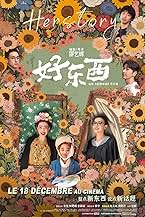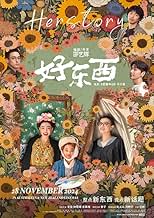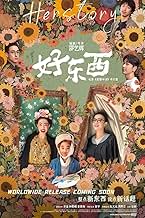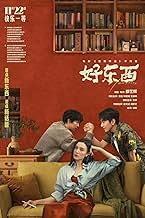VALUTAZIONE IMDb
7,6/10
1989
LA TUA VALUTAZIONE
Aggiungi una trama nella tua linguaWang Tiemei, a single mother, loses her job and moves, befriending neighbor Xiaoye who appears cheerful but is depressed. Their bond grows as Tiemei navigates relationships with her ex-husba... Leggi tuttoWang Tiemei, a single mother, loses her job and moves, befriending neighbor Xiaoye who appears cheerful but is depressed. Their bond grows as Tiemei navigates relationships with her ex-husband causing trouble.Wang Tiemei, a single mother, loses her job and moves, befriending neighbor Xiaoye who appears cheerful but is depressed. Their bond grows as Tiemei navigates relationships with her ex-husband causing trouble.
- Regia
- Sceneggiatura
- Star
- Premi
- 22 vittorie e 31 candidature totali
Recensioni in evidenza
At the Berlin screening, the audience was 99% Chinese, with 95% of them being women. Walking out of the cinema with my friend, I just felt utterly refreshed. It's been a long time since I felt, "I paid for the ticket and truly got an excellent experience in return."
The film isn't perfect-there are moments where you wonder if it's not deep enough, or if its structure feels limited, loose, and incomplete. Yet, that doesn't take away from the fact that it's light, joyful, and entirely comfortable-what a rare and precious quality that is. Every ten minutes you'll laugh along with other audience. It talks about feminism and women's self-discovery, but it doesn't feel detached from real life or overly dramatic. Neither does it rely on empty theories. Unlike some films, it doesn't give you the impression that the director is portraying an imagined version of life, but rather something genuine and relatable.
The film isn't perfect-there are moments where you wonder if it's not deep enough, or if its structure feels limited, loose, and incomplete. Yet, that doesn't take away from the fact that it's light, joyful, and entirely comfortable-what a rare and precious quality that is. Every ten minutes you'll laugh along with other audience. It talks about feminism and women's self-discovery, but it doesn't feel detached from real life or overly dramatic. Neither does it rely on empty theories. Unlike some films, it doesn't give you the impression that the director is portraying an imagined version of life, but rather something genuine and relatable.
Her Story is the kind of film where the three main characters - single mother Tiemei, her young daughter Moli and their neighbour Xiao Ye - get to talk about the experience of a first period for several minutes while a couple of male characters sit and listen without objection. It ALSO happens to be the kind of a film which topped the PRC box office for two weeks in a row.
Thus, I suspect it might be impossible for an outsider to understand the modern PRC without knowing it's now the kind of society which enthusiastically votes with their yuan for a film so feminist it makes something like Barbie or Wicked pale in comparison. Her Story gleefully namedrops the patriarchy, male privilege and structural oppression - and those are the parts which are played for laughs, as this rhetoric mainly comes from Tiemei's ex-husband. He believes this would impress her enough that she takes him back, yet it's quite transparent he doesn't really miss her as much as he misses the easy life when she was the perennially tired breadwinner.
Indeed, the truly refreshing thing about Her Story is that the romantic matters, while present, (and responsible for a good number of jokes) take a DECISIVE backseat to more prosaic concerns of Tiemei's work and the struggle to give her daughter the best start in life. This is such a massive contrast to even acclaimed Western cinema like Challengers, which did the exact opposite and where Tashi's daughter (about the same age as Tiemei's) barely registered even as an afterthought.
Here, we get a FAR more honest portrayal of what is likely to occupy the mind of a mother - from Moli's struggle to fit in with her peers from more privileged backgrounds, to her attempt to find herself in music (ultimately the dominant narrative thread) to health concerns over her eyesight. At the same time, Tiemei has to transition from being a journalist to an editor of women's magazine, when the struggles of running a profitable digital publication are seemingly as acute in the PRC as in the West.
On the other hand, the younger Xiao Ye seemingly has a more upbeat life less burdened with responsibilities - yet, as she grows closer to Tiemei and begins to take over some responsibilities of caring for Moli, we get a window into her own struggles. The conversations the three have over topics such as the meaning of a "white lie" can be surprisingly long and are often very revealing - while also managing to remain funny in a genuine way.
The only reason I'm not rating it even higher is because I saw this about a month ago, and I have to admit that in that time, some of its emotional resonance had already faded. Nevertheless, this is a definite recommendation.
Thus, I suspect it might be impossible for an outsider to understand the modern PRC without knowing it's now the kind of society which enthusiastically votes with their yuan for a film so feminist it makes something like Barbie or Wicked pale in comparison. Her Story gleefully namedrops the patriarchy, male privilege and structural oppression - and those are the parts which are played for laughs, as this rhetoric mainly comes from Tiemei's ex-husband. He believes this would impress her enough that she takes him back, yet it's quite transparent he doesn't really miss her as much as he misses the easy life when she was the perennially tired breadwinner.
Indeed, the truly refreshing thing about Her Story is that the romantic matters, while present, (and responsible for a good number of jokes) take a DECISIVE backseat to more prosaic concerns of Tiemei's work and the struggle to give her daughter the best start in life. This is such a massive contrast to even acclaimed Western cinema like Challengers, which did the exact opposite and where Tashi's daughter (about the same age as Tiemei's) barely registered even as an afterthought.
Here, we get a FAR more honest portrayal of what is likely to occupy the mind of a mother - from Moli's struggle to fit in with her peers from more privileged backgrounds, to her attempt to find herself in music (ultimately the dominant narrative thread) to health concerns over her eyesight. At the same time, Tiemei has to transition from being a journalist to an editor of women's magazine, when the struggles of running a profitable digital publication are seemingly as acute in the PRC as in the West.
On the other hand, the younger Xiao Ye seemingly has a more upbeat life less burdened with responsibilities - yet, as she grows closer to Tiemei and begins to take over some responsibilities of caring for Moli, we get a window into her own struggles. The conversations the three have over topics such as the meaning of a "white lie" can be surprisingly long and are often very revealing - while also managing to remain funny in a genuine way.
The only reason I'm not rating it even higher is because I saw this about a month ago, and I have to admit that in that time, some of its emotional resonance had already faded. Nevertheless, this is a definite recommendation.
10fdnyv
The film explores the modern day challenges of women in China and especially being a single mother. On a deeper level, it explores the ability for women to courageously live the life they wish to live. The expectations placed upon them and the relationships between mothers and daughters, and between women and 'womanhood'. Extrapolate this out though it's also about people in general living within the confines of social expectations set for them instead of chasing after the things that bring them joy - and the real costs of that.
Every so often a movie leaves me with thoughts and feelings beyond the plot that makes me want to watch it again. This is one of them.
The movie feels like a kindhearted friend telling you stories about ups and downs realities of a life well lived. I found myself laughing and crying with the characters and entranced by the connections, chemistries that they shared.
Unclear to me though if watching as a non-mandarin speaker will be able to understand the nuances of what's said.
If I have one complaint about the film it would be that it tried to tackle too many themes. Because of that points it felt like some of the commentary was a bit shallow. Nonetheless, it still got me thinking and apparently now writing about it.
Every so often a movie leaves me with thoughts and feelings beyond the plot that makes me want to watch it again. This is one of them.
The movie feels like a kindhearted friend telling you stories about ups and downs realities of a life well lived. I found myself laughing and crying with the characters and entranced by the connections, chemistries that they shared.
Unclear to me though if watching as a non-mandarin speaker will be able to understand the nuances of what's said.
If I have one complaint about the film it would be that it tried to tackle too many themes. Because of that points it felt like some of the commentary was a bit shallow. Nonetheless, it still got me thinking and apparently now writing about it.
Too many movies settle for just scratching the surface of deep topics, whereas "Her Story" jumps right in. This film is a triumph across the board; the playful artistic choices, colorful dialogue, and effortless flow from scene to scene. The dinner conversation may go down as one of my favorite film moments of the year. The film explores a variety of topics from motherhood to childhood education to depression without judgement and without pandering, respectfully leaving audiences to ponder them. It's a joy in English, even better if you know a little Chinese. Her Story (Hao DongXi) will rightfully go down as one of the best films of 2024.
NOTE: Minus 1 point for a depiction of a jobless single woman drinking Singleton straight out of the bottle, you must be joking single malts ain't cheap people..
NOTE: Minus 1 point for a depiction of a jobless single woman drinking Singleton straight out of the bottle, you must be joking single malts ain't cheap people..
Delightful movie that brings up serious topics about expectations from both society and from people themselves, without being somber or bringing in antagonists. All the characters are very mature, and shine through how they introspect and deal with their own issues.
Although the main topic woven through the plot is feminism, the film shows us similarities to expectations about talent, relationships, parenthood and school. How the characters grow around these topics is the real substance of the movie, and it's put together in a way that balances humor and substance well.
What's really bolding this back though, is that there are a few moments were the writer/director let themselves get carried away and we get characters essentially dictating what we are supposed to think in that moment. This is unnecessary as the movie was already getting us to think about these topics, and it really whiplashes you out of the movie at those points.
This even happens with the Shanghai location: at some point we see her walk past the Sihang storehouse full with bullet holes from where the legendary RoC company made their last stand against the Japanese, and the dad says something about not making noodles much because they're southerners. But then later the mom just says "we live in Shanghai" to her own daughter.
Overall definitely recommend, very uplifting and likeable for a large variety of audiences.
Although the main topic woven through the plot is feminism, the film shows us similarities to expectations about talent, relationships, parenthood and school. How the characters grow around these topics is the real substance of the movie, and it's put together in a way that balances humor and substance well.
What's really bolding this back though, is that there are a few moments were the writer/director let themselves get carried away and we get characters essentially dictating what we are supposed to think in that moment. This is unnecessary as the movie was already getting us to think about these topics, and it really whiplashes you out of the movie at those points.
This even happens with the Shanghai location: at some point we see her walk past the Sihang storehouse full with bullet holes from where the legendary RoC company made their last stand against the Japanese, and the dad says something about not making noodles much because they're southerners. But then later the mom just says "we live in Shanghai" to her own daughter.
Overall definitely recommend, very uplifting and likeable for a large variety of audiences.
Lo sapevi?
- QuizThe pattern on a T-shirt worn by Tiemei was created by American artist peopleivrloved.
I più visti
Accedi per valutare e creare un elenco di titoli salvati per ottenere consigli personalizzati
Dettagli
Botteghino
- Lordo in tutto il mondo
- 325.967 USD
- Tempo di esecuzione2 ore 3 minuti
- Colore
- Proporzioni
- 2.16 : 1
Contribuisci a questa pagina
Suggerisci una modifica o aggiungi i contenuti mancanti

























